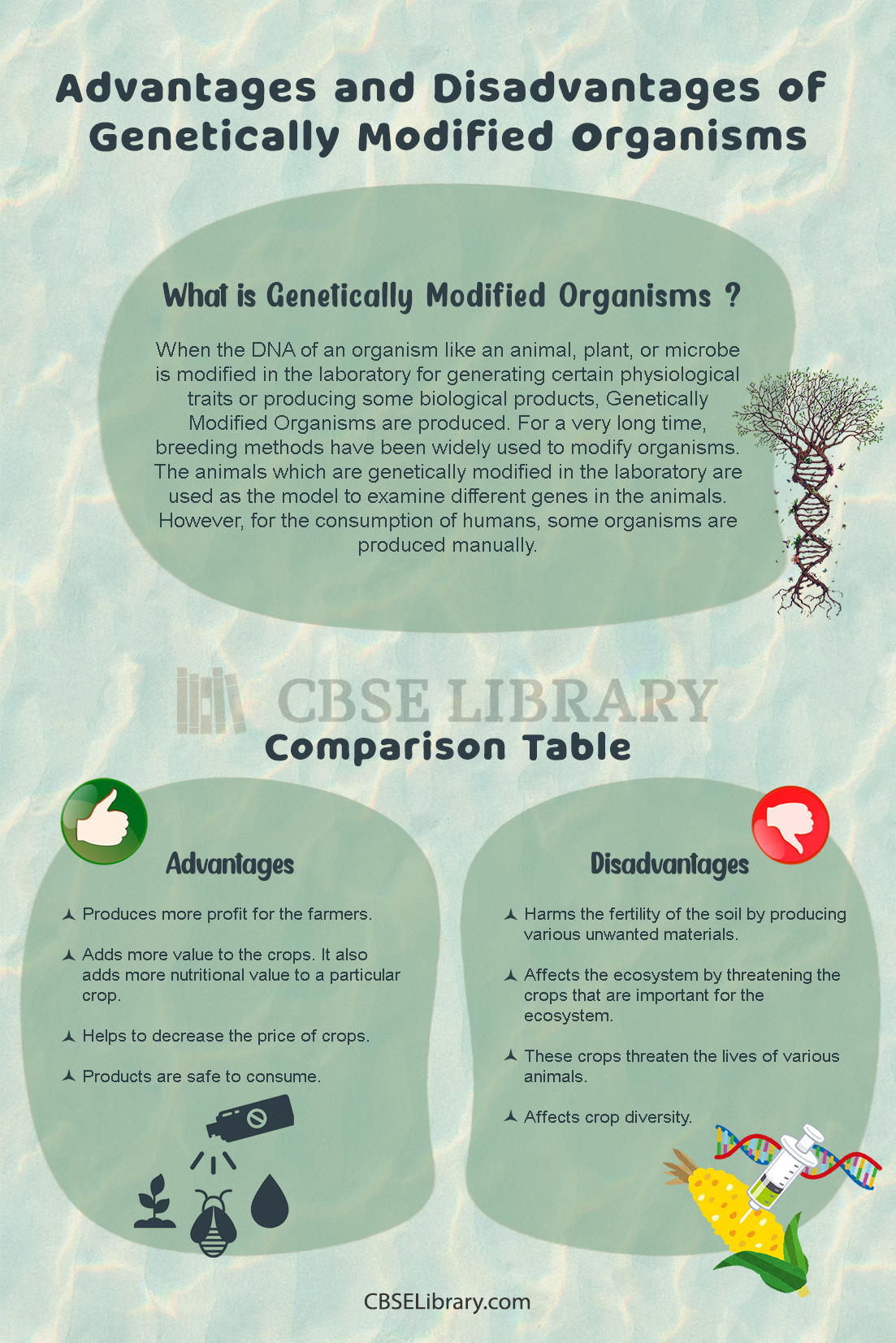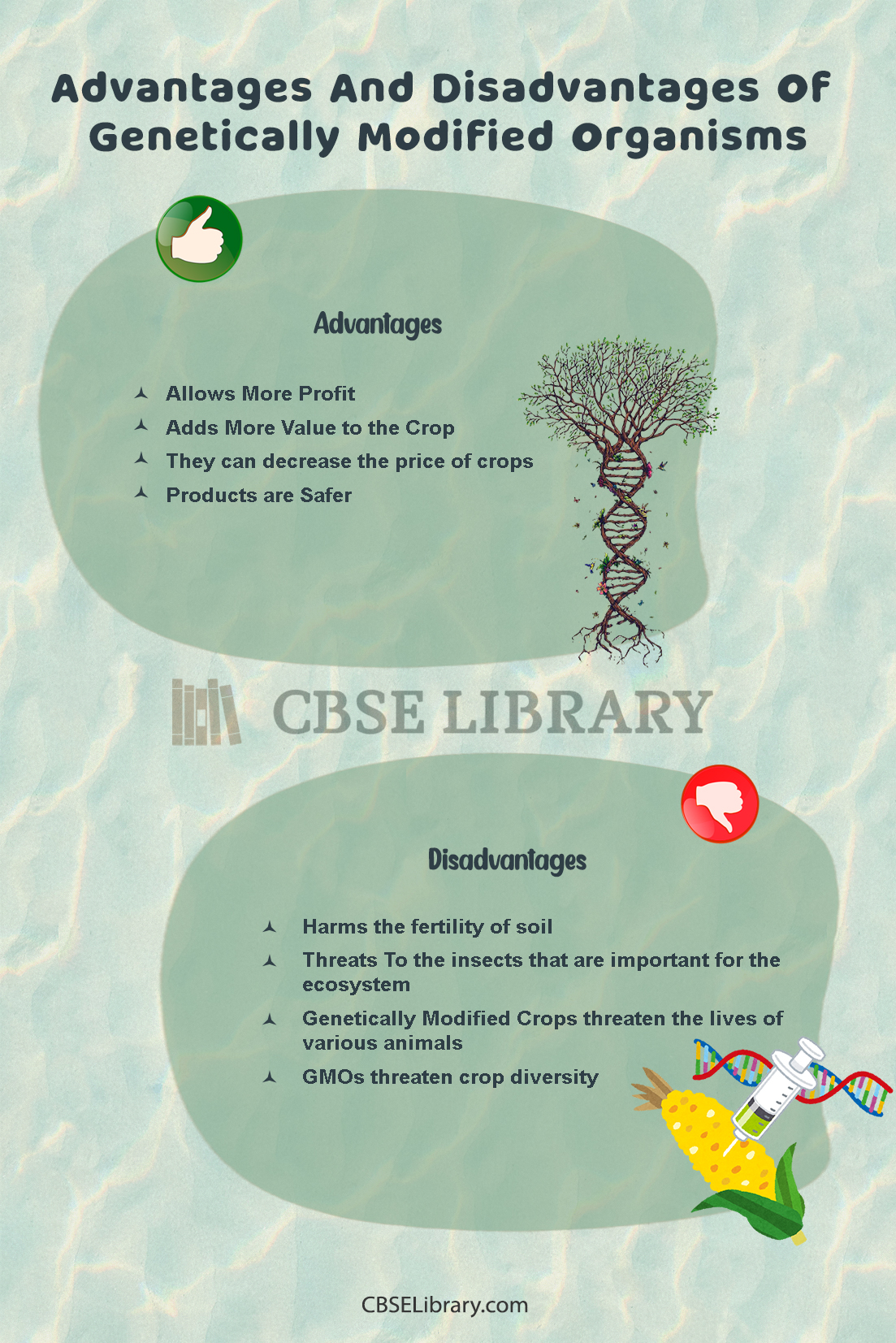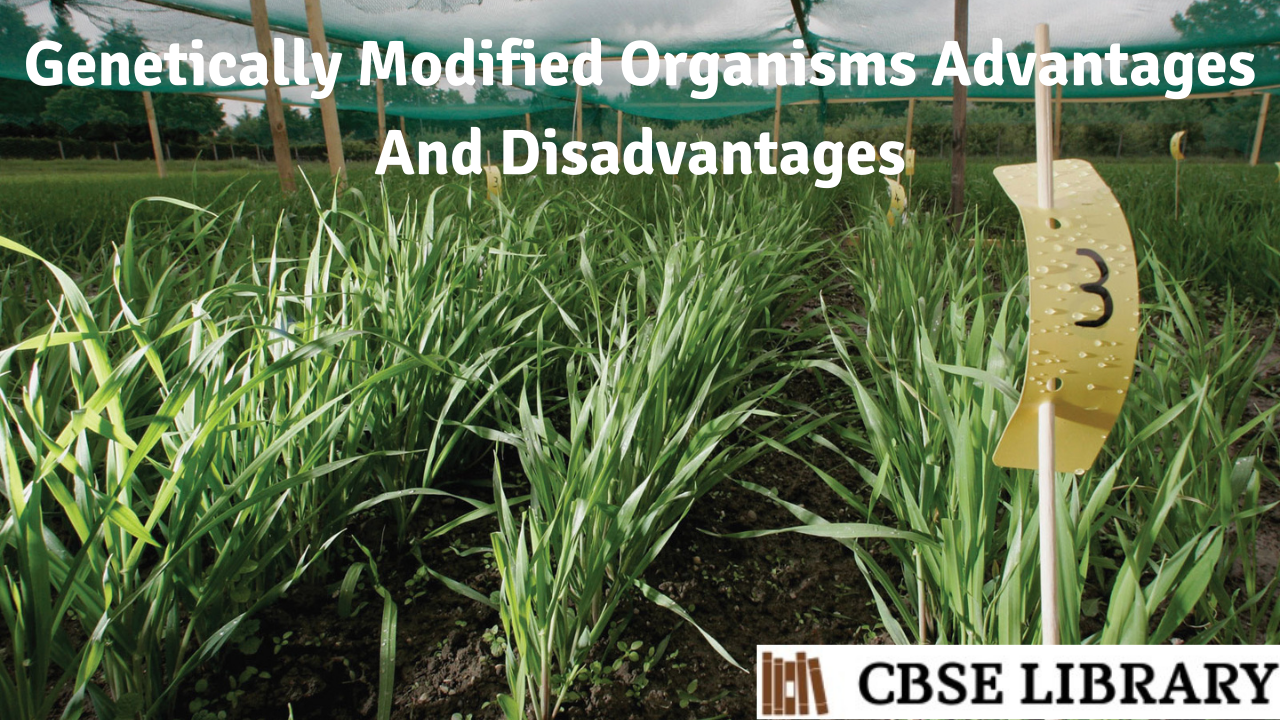Genetically Modified Food Advantages And Disadvantages: Genetically Modified Organisms (GMOs) have been flourishing for many years. Traditional breeding techniques along with scientific methods have been used in the alternation of genomes of various animals and plant life which has resulted in the birth of different and unique organisms ranging from hairless cats to sweet corn.
Students can also find more Advantages and Disadvantages articles on events, persons, sports, technology, and many more.
- Advantages of Genetically Modified Organisms
- Disadvantages of Genetically Modified Organisms
- Comparison Table for Advantages And Disadvantages Of Genetically Modified Organisms
- FAQ’s on Genetically Modified Food Advantages And Disadvantages
What are Genetically Modified Organisms? Advantages and Disadvantages of Genetically Modified Organisms
When the DNA of an organism like an animal, plant, or microbe is modified in the laboratory for generating certain physiological traits or producing some biological products, Genetically Modified Organisms are produced. For a very long time, breeding methods have been widely used to modify organisms. The animals which are genetically modified in the laboratory are used as the model to examine different genes in the animals. However, for the consumption of humans, some organisms are produced manually.
For example – Salmon fish matures faster because they are genetically engineered. In the mid- 1990s, genetically modified plants were also produced. Corn, soybeans, and sugar beets are genetically engineered and are consumed by a large number of people. The crops which are genetically modified are immune to diseases and pests and yield high-quality produce. It is advantageous to both farmers and consumers. GM crops are cheaper than naturally produced crops and if the nutritional value of the GM crops improves then it can help to eliminate starvation of the people. The process of modifying microorganisms like bacteria helps in producing important medicines like insulin and vaccines. Thus, the advent of GMOs has helped society extensively.
Characteristics of Genetically Modified Organisms
Let us discuss some of the significant characteristics of Genetically Modified Organisms.
- Requires Several Developed Scientific Techniques: Alteration of the genomes of various organisms like plants and animals requires developed scientific techniques. Scientists use different lab techniques to delete or alter DNA that may seem to be harmful to the GMOs. DNA of different animals and plants are synthetically prepared by scientists in laboratories.
- Made for Commercial, Medical, and Environmental Reasons: The basic intention of producing GMOs is for various commercial, medical, and environmental reasons. With the substantial increase in the world’s population, demand for food products has been rapidly increasing. The higher the population, the higher the food requirements. Thus, promoting the production of new GMOs. Similarly, GMOs are also used to treat and cure many chronic diseases like diabetes.
- Selective Breeding of Organisms: For the birth of an organism that has the desired characteristics that the scientists want, selective breeding is carried out. Organisms with similar characteristics are selected so that they can breed and reproduce offspring with the desirable qualities.

Advantages of Genetically Modified Organisms
The advantages of genetically modified organisms are given below.
- Allows More Profit: Genetically modified organisms have become a very easy way to earn more profit for the farmers. It also allows the farmers to spend less time on the resources. It is also economically beneficial as it allows the organisms to be pest resistant. Hence, the money used to remove pests is eliminated. In this way, genetically modified organisms allow more profit.
- Adds More Value to the Crop: A farmer prefers to grow genetically modified crops as these crops provide nutritional addition. Most importantly, it adds vitamins and minerals to those crops which lack them. Various regions in the world are heavily dependent on corn and rice. In these crops, plant genes can be added to boost their nutritional value. This will be used to nourish the malnourished population. As mentioned above, GMOs are pest resistant, thus the crop yields are increased.
- They can decrease the price of crops: Advanced crops with higher nutritional value and higher yields signify a decrease in the prices of food. As this is a benefit, it can be passed to the consumers at a very cheap rate. Due to the GMOs, the families who cannot buy food for everyday consumption will be helped. As the price of food is cheaper, those families can afford to buy GMO crops.
- Products are Safer: It is found that genetically modified crops are safe for the consumption of human beings. Various researches and studies are conducted that provide us with this information. Furthermore, it is also found that genetically modified crops are safer than traditional crops.
Disadvantages of Genetically Modified Organisms
The disadvantages of genetically modified organisms are as follows.
- Harms the fertility of soil: In the process of growing a genetically modified crop, new genes are produced. For instance, new genes in corn are produced to get the genetically modified variant of corn. Research is conducted that tells the long-term harm of growing genetically modified crops. Particularly, the GM leaves over unwanted residuals that harm the fertility of the soil. Researchers say that, despite the absence of GMP, the strain persisted for more than six years. GMP is genetically modified plants.
- Threats To the insects that are important for the ecosystem: As mentioned above, the growth of genetically modified plants leftover various residuals. These residuals are found to be deadly for various insects that are significant to the ecosystem. This is a very dangerous sign as some important insects such as butterflies play a very important role in the growth of a particular crop.
- Genetically Modified Crops threaten the lives of various animals: Genetically modified plants are found to act as a mediator to the transfer of genes from wild plants to the creation of weeds. To keep the creation of weeds under control, various scientists are producing herbicides that can be used to stop the passage of creation. But, this creates a different problem. Herbicides are not cheap in rate, they are quite expensive. This can be a problem for various farmers.
- GMOs threaten crop diversity: The genes produced from genetically modified crops are harming organic farming resulting in threatening crop diversity. If the diversity of crops is harmed, it will lead to a disaster. This will have a serious impact on the world’s population.
Comparison Table for Advantages And Disadvantages Of Genetically Modified Organisms
| Advantages | Disadvantages |
| Produces more profit for the farmers. | Harms the fertility of the soil by producing various unwanted materials. |
| Adds more value to the crops. It also adds more nutritional value to a particular crop. | Affects the ecosystem by threatening the crops that are important for the ecosystem. |
| Helps to decrease the price of crops. | These crops threaten the lives of various animals. |
| Products are safe to consume. | Affects crop diversity. |

FAQ’s on Genetically Modified Food Advantages And Disadvantages
Question 1.
What are Genetically Modified Organisms?
Answer:
Genetically modified organisms also known as GMOs are those plants, animals, and microbes whose DNA ( Deoxyribonucleic acid) are altered by transferring their genes. These DNAs are altered using genetic engineering techniques. Some plants such as corn are examples of genetically modified organisms. There are various animals such as cattle and dogs who undergo selective cross-breeding.
Question 2.
How do GMOs keep the product safer?
Answer:
The crops produced by modifying them genetically are safer for consumption. Various researches and surveys have been conducted which prove that genetically modified plants or crops are safe for human consumption. It is also considered safer than traditional crops.
Question 3.
Can GMOs harm the fertility of soil?
Answer:
Yes, GMOs harm the fertility of the soil. In the process of growing a genetically modified crop, new genes are produced. For instance, new genes in corn are produced to get the genetically modified variant of corn. In this way, it produces various unwanted residues which harm the fertility of the soil.
